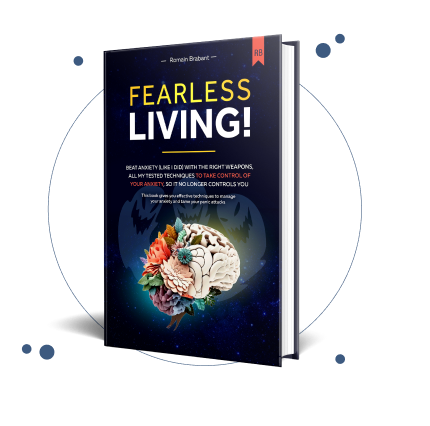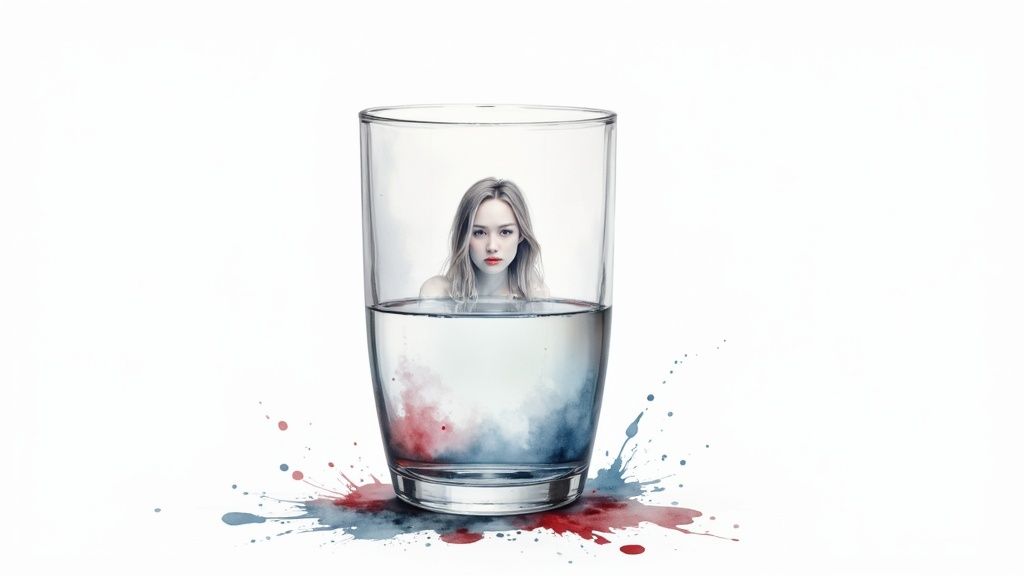
Yes, dehydration can absolutely trigger anxiety attacks or make existing ones feel a whole lot worse. When your body is running low on water, it can flip into a state of stress. This may kick off a cascade of physical symptoms like a racing heart, dizziness, and confusion—sensations that are practically identical to a panic attack.
Understanding this powerful connection is one of the first, most tangible steps you can take toward reclaiming control and finding a path to living panic-free.
The Surprising Link Between Dehydration and Anxiety
Ever been hit by a sudden wave of panic and couldn't figure out why? The answer might be simpler than you think. It could be in your water bottle.
The link between your hydration levels and your mental state isn't just a wellness theory; it's a physiological reality. Your body's internal alarm system can be set off simply because it's running low on its most critical resource: water.
This isn't an "all in your head" reaction. It's your body sending out a very real distress signal. Dehydration can force your heart to pump harder, make your blood thicker, and interfere with the delicate mineral balance your nerves need to fire correctly. This creates a perfect storm for anxiety-like symptoms to bubble up, often without any obvious emotional reason. Recognizing this gives you a powerful tool to begin your healing journey.
How Water Loss Affects Your Body and Mind
It doesn't take much. Losing just 1-2% of your body's water is enough to kickstart this whole process.
Research is making it clearer than ever that there's a direct physiological line between being dehydrated and feeling anxious. Since the human brain is about 75% water, it’s incredibly sensitive to even small dips in hydration. Not drinking enough can throw off your brain's delicate chemistry, messing with neurotransmitter production and cranking up stress hormones.
In fact, studies have found that being even mildly dehydrated is linked to higher levels of cortisol—the body's main stress hormone. More cortisol often means more panic and agitation.
This simple visual breaks down how a small amount of water loss can quickly lead to physical changes that feel just like anxiety, and how you can take control.
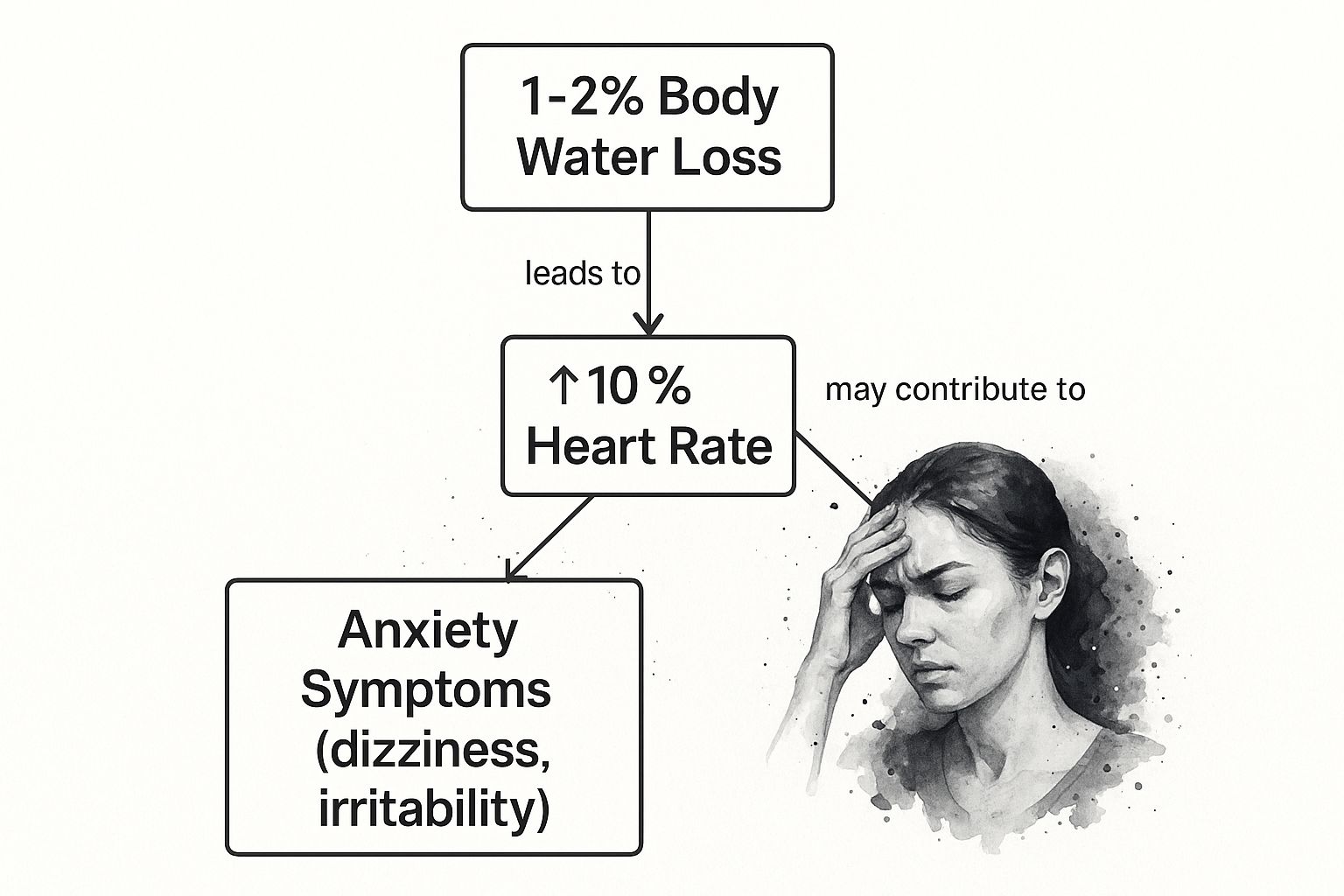
As you can see, even mild dehydration can make your heart rate jump, which is one of the most common and unsettling symptoms of anxiety. By managing your hydration, you can directly influence these physical responses and pave the way for a calmer state of being.
Dehydration Symptoms vs. Anxiety Attack Symptoms
The overlap between the physical signs of dehydration and an anxiety attack is staggering. When you see them side-by-side, it becomes obvious why one can so easily be mistaken for the other, or why dehydration could be the trigger you've been missing.
| Symptom | Common in Dehydration? | Common in Anxiety Attacks? |
|---|---|---|
| Racing Heart / Palpitations | ✔️ | ✔️ |
| Dizziness or Lightheadedness | ✔️ | ✔️ |
| Headache | ✔️ | ✔️ |
| Confusion or Disorientation | ✔️ | ✔️ |
| Muscle Weakness or Cramps | ✔️ | ✔️ |
| Fatigue or Tiredness | ✔️ | ✔️ |
| Nausea or Stomach Discomfort | ✔️ | ✔️ |
| Shortness of Breath | ✔️ | ✔️ |
This table doesn't just show a list of symptoms; it reveals a crucial, hopeful clue. If you're prone to anxiety, paying close attention to your hydration could be a game-changing preventative strategy on your path to healing.
The Role of Essential Minerals
But it's not just about the water. To really get the full picture, it's worth understanding what electrolytes are and their importance. Think of them as the tiny electrical messengers that manage everything from nerve signals to muscle contractions.
When you're dehydrated, you're not just losing water; you're also losing these critical minerals, which puts even more stress on your system.
Recognizing that hydration is just one piece of the puzzle can be incredibly empowering. Of course, there are many other potential factors at play, and you can learn more by exploring some of the https://anxietychecklist.com/common-anxiety-causes. Still, this knowledge gives you something tangible to work with—proof that managing your hydration is a powerful, practical tool on your journey to a calmer, panic-free life.
How Your Body Can Mistake Thirst for Fear
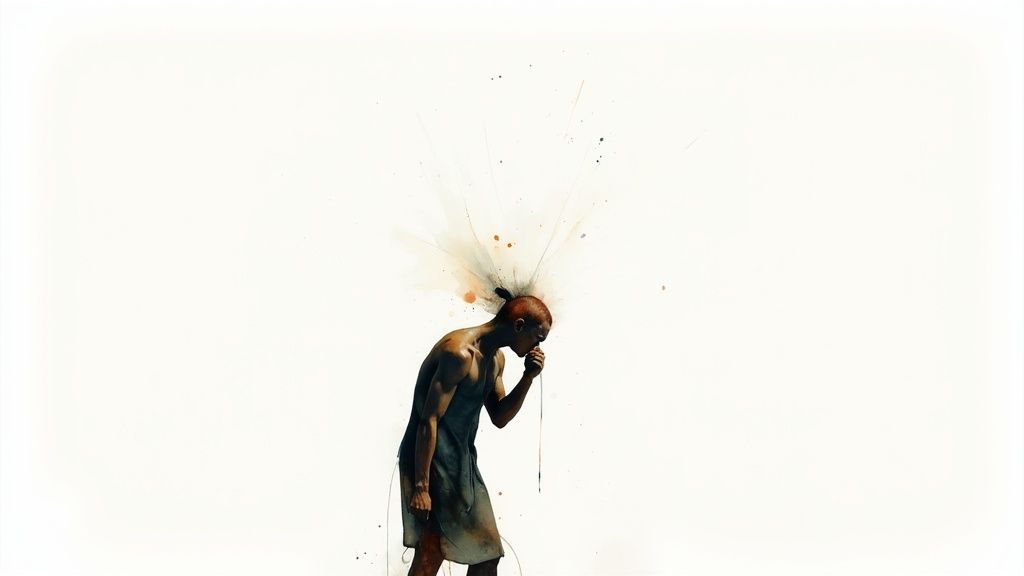
Think of your nervous system as a high-tech communication network that runs through your entire body. For that network to work properly, it needs a conductor—and that conductor is water. It's the very medium that keeps all the electrical signals flowing smoothly.
When your water levels dip, that network starts to glitch.
This isn't just a minor technical issue. A dehydrated system can send out false alarms that your brain interprets as immediate danger. Your body isn't trying to trick you; it's sending a powerful distress signal because it lacks the basic resources to function correctly. That signal can feel identical to a sudden wave of panic. But the hopeful truth is that you can often resolve this signal simply by drinking a glass of water.
The Cortisol Connection
When you're dehydrated, your body registers it as a major stressor. In response, it starts pumping out more of the stress hormone cortisol. This chemical messenger is your body's go-to for preparing to handle a threat—a reaction that's absolutely critical for survival.
Higher cortisol levels kick your system into high alert, causing a faster heart rate, rapid breathing, and tense muscles. Sound familiar? These are the exact physical responses that define a panic attack. Your body is just doing its job, but it's acting on a misleading signal.
Understanding this process is incredibly empowering. It shows that what feels like an overwhelming emotional event can often have a simple, physical root cause—one you can address directly just by hydrating. This is a real, actionable step toward healing.
How Electrolytes Can Scramble Your Signals
It’s not just about the amount of water; it’s also about what’s in it. Your body relies on a delicate balance of electrolytes—minerals like sodium, potassium, and magnesium—to transmit nerve impulses correctly. These are the tiny sparks that carry messages between your brain and every other part of your body.
Dehydration throws this delicate balance completely out of whack. When electrolytes are low, your nerve signals can become weak, jumbled, or even misfire entirely. This can lead to some pretty unsettling physical symptoms, like:
- Muscle twitching or weakness
- Dizziness and mental fog
- An irregular heartbeat or palpitations
Each of these sensations can set off alarm bells, convincing your brain that something is terribly wrong. Your mind then scrambles to find a reason for these feelings, often landing on the conclusion that you’re having an anxiety attack. This entire chain reaction is a core part of your body's built-in alert system, which you can read more about in our guide to the fight-or-flight response.
By learning to answer your body’s simple call for water, you can soothe your nervous system and prevent these false alarms from ever going off. It's a hopeful and practical first step toward managing anxiety and building a life free from the grip of panic.
Recognizing Dehydration-Fueled Anxiety Warning Signs
Learning to tell the difference between anxiety sparked by dehydration and anxiety from other sources is a game-changer. This isn't about giving yourself one more thing to worry about; it's about empowerment. When you build this kind of self-awareness, you can catch the first signals your body sends out and respond with care, not fear.
Imagine you’re hit with a sudden, out-of-nowhere wave of dread in the middle of the afternoon. Your first instinct might be to spiral. But what if you could pause and ask a simple question instead: "Could I just be thirsty?"
This shift in mindset is a huge step toward building resilience. It turns a potential moment of panic into a chance for self-care, giving you a real, tangible way to step in early and manage your mental state with confidence. This is how healing begins.
The Subtle Early Clues
Long before your heart starts racing or you feel dizzy, your body sends out quiet messages that it needs water. The problem is, these early signs often look a lot like everyday stress or tiredness, so they’re incredibly easy to miss.
Learning to hear these initial whispers is your best defense. Keep an eye out for:
- Brain Fog: That feeling like your thoughts are moving through mud.
- Irritability: Snapping over small things or just feeling annoyed for no reason.
- Sudden Fatigue: An unexpected energy crash, even if you slept well.
- A Mild, Nagging Headache: A dull ache that seems to pop up from nowhere.
These are your body's way of telling you its resources are running low. When you learn to spot them, you can act before the more intense physical sensations of anxiety even get a chance to build. You are in control.
The Science Behind the Symptoms
This isn’t just a hunch; there's real research backing this up. Epidemiological data consistently shows a strong link between low water intake and a spike in anxiety symptoms. In fact, multiple studies have found that people who drink less water are far more likely to report feelings of tension, confusion, and anxiety.
And it makes sense. When you consider that dehydration can cause physical symptoms like heart palpitations and dizziness—which are classic anxiety signs—it's easy to see how being low on water can either mimic or flat-out trigger an anxiety attack.
This is actually incredibly hopeful news. It means some of the scary physical feelings you're having might not be a sign of a deep psychological issue, but a simple, fixable physical need. You have the power to address this directly.
Of course, understanding the psychological side of things is still vital. Learning practical strategies for how to keep your mind right in panic situations can make a huge difference in how you respond.
If you want a structured way to get a clearer picture of your symptoms, a tool like the GAD-7 anxiety test can be a really helpful starting point.
Your Practical Hydration Plan for a Calmer Mind
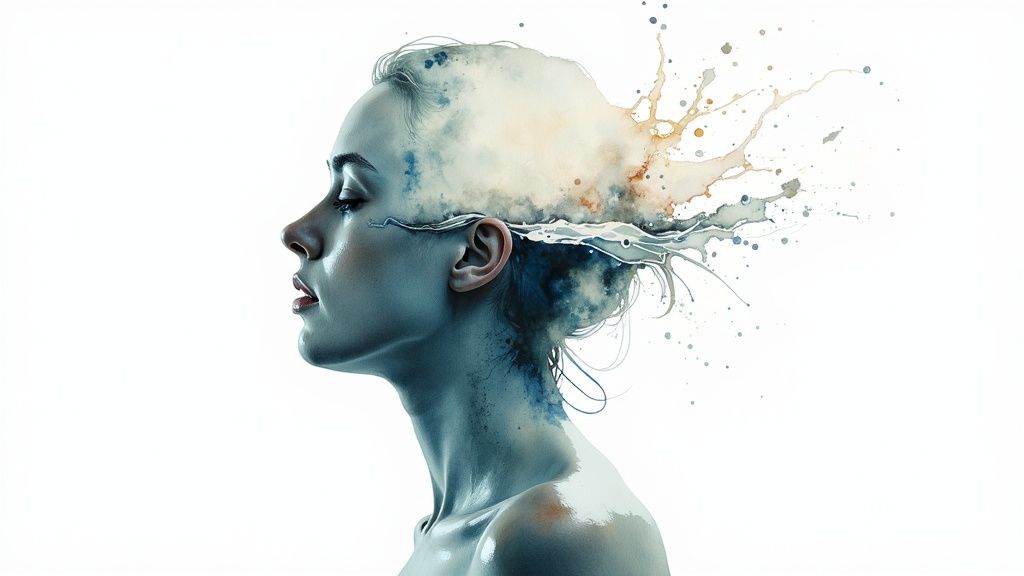
Alright, you get the connection between dehydration and anxiety. That's a huge step. Now, let's turn that knowledge into a powerful, calming action plan. This isn't about some drastic overhaul of your life. It's about building a simple, sustainable hydration routine that genuinely supports your mental well-being and gives you back a tangible sense of control.
Creating this plan is a profound act of self-care. You're essentially telling your body that you're listening to its needs, which can dial down the internal stress that so often fuels anxiety attacks. It’s a practical strategy that offers a clear path forward, empowering you to manage your symptoms and move toward a more peaceful, panic-free life.
Building Your Foundational Hydration Habit
Forget the generic advice to just "drink eight glasses a day." The only plan that truly works is one that fits seamlessly into your life. We're aiming for consistency here, not perfection. Every step forward is a win.
The best approach? Sip water steadily throughout the day. Chugging huge amounts all at once can just overwhelm your system. Consistent sipping, on the other hand, keeps your body in a state of optimal balance and prevents those hydration dips that can trigger your body's stress response.
A great place to start is with a glass of water first thing in the morning. It’s a simple act that rehydrates you after a long night's sleep and sets a positive, intentional tone for the rest of your day—a day where you are in control.
Smart Hydration Strategies
Making hydration feel effortless is the secret to making it stick. You don't need a complicated system, just a few smart tactics to keep it from falling off your radar.
- Keep Water Accessible: Always have a water bottle right there—on your desk, in your car, or in your bag. Visual cues are incredibly powerful reminders to take a sip.
- Set Gentle Reminders: Use your phone or even a simple sticky note to prompt you to drink every hour. This helps build the habit until it becomes second nature.
- Eat Your Water: A lot of fruits and vegetables have surprisingly high water content. Snacking on things like cucumber, watermelon, strawberries, and bell peppers is an easy way to boost your overall hydration.
Remember, every sip is a small victory. It's a conscious choice you are making to support your mind and body, reinforcing the powerful idea that you are not helpless against anxiety—you have tools to heal and thrive.
The Role of Electrolytes and Mindful Choices
While water is definitely your best friend, sometimes your body needs a little extra support. This is especially true if you've been sweating a lot from exercise, heat, or even an anxiety-induced sweat. That's where electrolytes come in.
Electrolytes are crucial minerals like sodium and potassium that help your nerves function properly. When you're feeling depleted, an electrolyte-rich drink or a simple snack like a banana or a handful of almonds can help restore that balance quickly.
At the same time, it's just as important to be mindful of what you're drinking. Sugary sodas and highly caffeinated beverages can actually work against you, contributing to dehydration and making those feelings of anxiety even worse. You can choose to nourish your body and mind instead.
Hydration-Boosting Foods and Beverages
Discover delicious foods and drinks that contribute to your daily hydration goals, offering refreshing alternatives to plain water.
| Item | Approximate Water Content | Additional Benefits |
|---|---|---|
| Cucumber | 96% | Rich in antioxidants and vitamin K. |
| Watermelon | 92% | Contains electrolytes like potassium and magnesium. |
| Strawberries | 91% | Excellent source of vitamin C and fiber. |
| Cantaloupe | 90% | High in vitamins A and C. |
| Broth/Soup | 92% | Can replenish sodium and other electrolytes. |
| Celery | 95% | Low in calories and provides fiber. |
| Coconut Water | 95% | Natural source of electrolytes. |
| Herbal Tea | 99% | Offers calming properties (chamomile, peppermint). |
Incorporating these items can make staying hydrated more enjoyable and add valuable nutrients to your diet, supporting both your physical and mental health.
Focusing on your hydration is just one piece of the puzzle. To build a truly resilient foundation against anxiety, it helps to look at the bigger picture. You can discover more powerful strategies by exploring other lifestyle and diet changes for anxiety management. This knowledge helps you create a well-rounded approach to your mental health, putting you firmly back in the driver's seat.
How Your Drink Choices Impact Anxiety
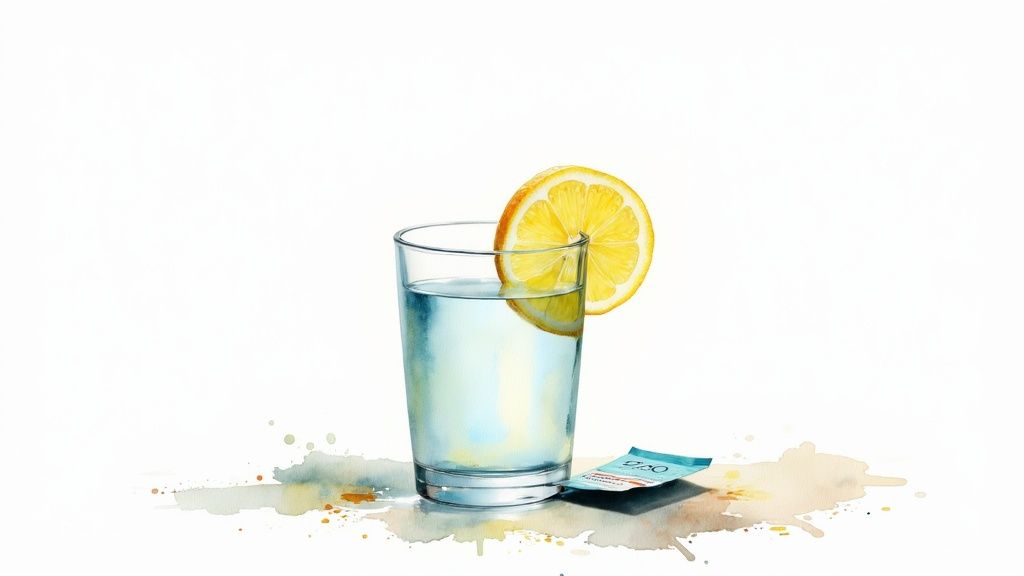
True hydration for a calm mind goes beyond just how much water you drink—it’s also about what you drink. Thinking about this isn't about creating a long list of forbidden pleasures. Instead, it’s about giving yourself more power and understanding how simple swaps can either move you closer to peace or unknowingly keep your system on high alert.
Here's the catch: some drinks, while liquid, don’t actually hydrate you very well. In fact, some can do the exact opposite.
Take beverages with caffeine, like coffee and certain teas. They often have a diuretic effect, which is a fancy way of saying they make you urinate more frequently. This can lead to a net loss of fluid and essential minerals your body needs to stay balanced. This process can subtly chip away at your hydration, potentially worsening the very physical symptoms of anxiety you’re trying to manage. It's a frustrating cycle, but one you can absolutely break.
The Surprising Anxiety Link to Common Drinks
It’s easy to assume that any fluid is good fluid, but your body doesn't see it that way. That morning coffee might feel like a non-negotiable part of your routine, but the caffeine spike can mimic the jittery, on-edge feeling of anxiety. When you combine that with its diuretic properties, you've got a perfect storm for feeling unsettled.
And it’s not just a hunch—research is increasingly backing this up. One compelling study of female university students found a direct link between poor hydration and higher anxiety levels. Interestingly, the study also pointed out that those who regularly drank things like coffee and certain teas showed more anxiety. You can find more details about how beverage choices can influence mental health on Solara Mental Health.
This connection offers a powerful, hopeful insight. By making more mindful choices about what you sip on, you gain another layer of control over your well-being.
This knowledge is about empowerment, not restriction. It’s a reminder that you have the power to build a lifestyle that consistently nurtures your mind, one conscious sip at a time. This is a key step toward lasting freedom from panic.
Making Mindful Swaps for Lasting Calm
So, what does this look like in daily life? It’s all about small, intentional shifts. You don't have to give up your favorite latte forever. It might just mean having a large glass of water first, or maybe switching to decaf in the afternoon.
Consider these simple but effective swaps:
- Instead of a second coffee, try a calming herbal tea like chamomile or peppermint.
- Instead of a sugary soda, infuse a pitcher of water with fruit like lemon or berries.
- Instead of an energy drink, have a glass of coconut water to replenish electrolytes.
Each of these choices helps support your body's natural state of balance. By dialing back the diuretic and stimulating drinks, you help keep your nervous system calm and your body properly hydrated—a key piece of the puzzle in managing anxiety.
This proactive approach fits perfectly with other holistic strategies. You might also be interested in exploring various naturopathic treatments for anxiety to build a well-rounded wellness plan. By understanding these connections, you’re not just avoiding triggers; you’re actively building a foundation for a panic-free life.
Common Questions About Dehydration and Anxiety
When you start connecting the dots between how much water you drink and how anxious you feel, a lot of questions pop up. It’s only natural. Getting clear answers is a huge part of feeling like you’re back in the driver's seat on your healing journey.
Let's walk through some of the most common ones. Think of this as a conversation to help you build a solid plan and move forward with a little more confidence and hope.
How Quickly Can Dehydration Trigger an Anxiety Attack?
Way faster than you’d think. Even mild dehydration, which can sneak up on you in just a few hours, is enough to get the ball rolling. This is especially true on a hot day, after a tough workout, or even if you've just been so swamped at work you forgot to grab a glass of water.
Once your brain gets even slightly starved of fluid, the body's stress response can kick in. For some, it starts subtly—maybe your heart starts beating a little too fast, or you feel a bit dizzy out of nowhere.
The real challenge starts when your mind interprets these unexpected physical sensations as a threat. That’s when a little dizziness can quickly spiral into a full-blown panic attack. It’s a lightning-fast chain reaction, which is why sipping consistently throughout the day is your best defense. It's about prevention, not just reaction, and a core strategy for living panic-free.
Can Drinking Water Stop a Panic Attack After It Starts?
While it's not an instant "off switch," drinking water during a panic attack can be a surprisingly powerful anchor. The simple act of sipping cool water gives you something tangible to focus on when your thoughts are spiraling out of control. It naturally encourages you to slow down and regulate your breathing, which is a major step in calming your ramped-up nervous system.
Physiologically, you're also starting to tackle the root cause if dehydration was the trigger in the first place. Just remember, it takes time for your body to absorb the water and get back into balance.
Think of it less like a cure and more like a calming guide. Drinking water helps steer you back toward equilibrium while giving you an active role in your own recovery. It is a hopeful action you can take in a difficult moment.
What If I Stay Hydrated but Still Have Anxiety?
This is a really important question, because a panic-free life is absolutely possible, even if hydration isn't the only piece of your puzzle. Staying hydrated is a foundational piece of mental wellness, but anxiety is often complex with many different roots.
If you’re doing a great job with your water intake but still struggling, that's a clear signal that there are more healing steps to take. It's not a setback, but an invitation to explore further.
Reaching out to a doctor or a therapist isn't a sign of failure—it's a brave and powerful step toward complete healing. They can help you dig deeper to find other potential triggers and build a plan that’s tailored specifically for you. This could mean trying therapies like Cognitive Behavioral Therapy (CBT), making other lifestyle tweaks, or considering medication if it's the right fit.
Think of proper hydration as the solid ground you build on. It’s not the whole house, but it’s an essential part of the foundation for a life free from anxiety.
Are Electrolyte Drinks Better Than Water?
For your day-to-day hydration needs, plain water is almost always the winner. It's simple, effective, and exactly what your body is designed to run on.
But there are times when an electrolyte drink can be a huge help. Electrolytes are crucial minerals—think sodium, potassium, and magnesium—that keep your nerves firing correctly and manage your body's fluid balance. You can lose them fast when you sweat heavily, like during a marathon, a heatwave, or even after a nasty bout of the flu. In those specific cases, an imbalance can mimic anxiety symptoms like muscle twitches or heart palpitations.
For most of us, a balanced diet with plenty of fruits and vegetables keeps our electrolytes in check. The best strategy is to make water your go-to and use electrolyte drinks only when you truly need to replace what you've lost. This smart approach gives your body exactly what it needs to support a calm, resilient nervous system.
At The Anxiety Checklist, we believe that understanding your anxiety is the first step toward overcoming it. Our Fearless Living system provides a practical, action-oriented toolkit designed to help you regain control and build a life without fear. If you're ready to turn knowledge into lasting change, explore our program at https://anxietychecklist.com.

